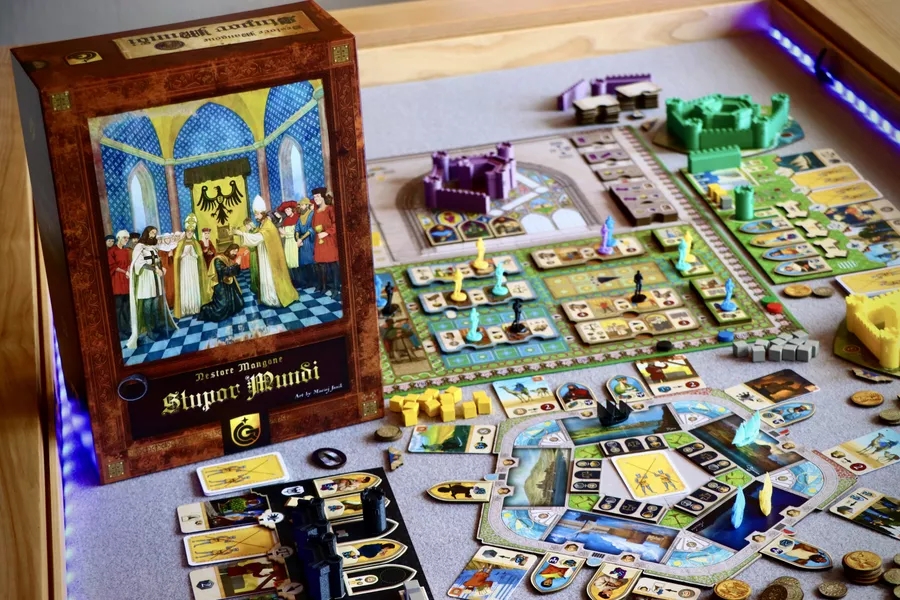Frederick II, often called “Stupor Mundi” or “Wonder of the World,” was a powerful leader whose kingdom included parts of what are now Germany and Italy. In the board game Stupor Mundi, players take on the roles of his trusted helpers, called vassals, who build castles, make friends with allies, and hire experts to earn the emperor’s favor.
👥 1-4 players, ages 14+
⌛ Playing time: 90-150 minutes
📝 Designer: Nestore Mangone
🎨 Artwork: Maciej Janik
🏢 Publisher: Quined Games (prototype copy provided)
Check out the Gamefound campaign by clicking here



The Gameplay of Stupor Mundi
When you play, you may start by moving your ship on a board representing a sea journey around the Mediterranean. Your ship’s location may affect the action you can take next. Each turn, you play a card into one of the slots under your player board: face up to use its ability, or face down to do a basic action.
Your player board shows five main things you can do. Three of these actions depend on where your ship is. You might gather allies who will help you score points, trade with local people to get the resources you need, or pick up new cards that give you better actions for later. There’s also a way to promote your experts, which helps you move forward on three paths. Each time you move, you swap a smaller benefit for a bigger one. The last action lets you build parts of your castle on your personal game board. Building your castle not only brings in more resources during the game’s income phase but also improves your options for actions later. For example, adding walls and towers gives you space for more allies and storage, and completing your keep gives you ongoing benefits like extra actions or more room to hold cards.


Certain actions trigger the creation of edicts, which are like royal commands used to manage Frederick’s possessions. These edicts control things like his castle structures, resources, and allies. They’re really important because they can greatly increase how many points your allies give you.
At the end of each game round, you count up the income from your castle and points from your allies. Allies work in different ways—some give you points based on what you’ve achieved yourself, while others give points based on how well you’re doing compared to Frederick. This means you need to keep an eye on Frederick’s status and use the edicts wisely to stay ahead.
The game ends when a player finishes building their castle, or if you can’t refill the stack of advanced action cards or edicts. A brief final scoring follows to determine the most successful vassal, who is then declared the victor.



A Peek at the Prototype
Stupor Mundi, designed by Nestore Mangone, is a Eurogame that’s geared towards 1-4 players aged 14 and up. The game lasts between 90 to 150 minutes and is published by Quined Games as the 28th entry in their Masterprint Series. A crowdfunding campaign for Stupor Mundi is set to launch on May 20th on Gamefound. Given the solid reputation of Quined Games and designer Nestore Mangone, it’s no surprise that this game tops our list of anticipated releases for the year.
We had the opportunity to try a prototype version of Stupor Mundi. Please keep in mind that the rules and components in the prototype are not final and may undergo changes. The rulebook and components are still in development, but the artwork by Maciej Janik already brings an appealing aesthetic to the game.
Despite its seemingly simple rules, Stupor Mundi targets expert players. It’s easy to learn and quick to teach, supported by clear and helpful iconography. The gameplay mechanics involve classic Eurogame elements like deck-building, hand management, and resource management, yet they provide a tight and engaging experience. What sets this game apart is its level of interaction among players, which is higher than many traditional Eurogames. This is largely due to the edicts—special rules that let players influence not only their own scores but also those of their opponents.


Keeping an eye on other players is crucial in Stupor Mundi. Allies in the game greatly affect how many points you score, and using edicts to adjust the game environment is a major strategy. Players can influence Frederick’s situation to benefit themselves and challenge their opponents, which can be a straightforward strategy. Also, earning points through specialists and corresponding actions, combined with building your castle and generating income, can pave multiple paths to victory.
The game includes a diverse mix of edicts, cards, and allies, thus every game session is unique, and the gameplay can unfold in many different ways. Depending on how many are playing, the game adjusts the number of action cards and allies around the voyage board. This means that no two games are the same, and players must continually adapt their strategies.


Final Thoughts
We thoroughly enjoyed our sessions with Stupor Mundi. It blends a relatively simple ruleset with a game full of meaningful decisions and player interactions. The game keeps you on your toes with lots of player interaction, offering a play experience that feels different every time you play.
For those eager to try Stupor Mundi themselves, there’s an online version available on BoardGameArena. The upcoming crowdfunding campaign will offer two versions of the game: one with plastic components and another with wooden pieces, catering to different preferences. You can find the campaign page here on Gamefound.
📝 Disclaimer: We played a prototype provided by the publisher, so some elements might still be adjusted.





